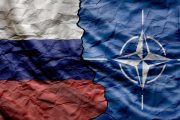For the first time since the 1950s, a NATO country has shot down a Russian military aircraft. In the increasingly crowded, chaotic skies over northern Syria, a Turkish F-16 shot down a Russian Sukhoi-24 that had supposedly entered Turkish airspace. Video of the stricken jet shows both Russian pilots parachuting to the ground in the mountains of northern Syria’s Latakia province, where they were both apparently killed by Syrian Turkmen militia fighters when they reached the ground.
This was not the first instance of Russian warplanes allegedly violating Turkish airspace. Turkey has registered strong objections with Russia over the past several weeks regarding not only brief and possibly accidental Russian incursions into Turkish airspace during bombing runs, but also Russian attacks on Turkmen positions in northern Syria. Syria’s Turkmen population — ethnic Turks who happen to live in Syria — are supported by Turkey in their opposition to the Assad regime.
In this instance, Turkey claims to have warned the Russian plane 10 times to change course before shooting it down. Russia, meanwhile, denies that the incursion took place and is claiming that the shooting down actually occurred over Syrian airspace. From video of the event and the fact that the two Russian pilots and the remains of the plane came down well within Syrian territory, it does appear likely that Turkey shot down the Russian aircraft after it left Turkish airspace. Moreover, it is not clear whether the Russian pilots received or understood the Turkish warnings, since neither the frequency nor the language of the broadcast warnings has been made public. The Turkish border where the plane was shot down has a narrow southward salient a few miles across that would be difficult for even careful pilots to avoid crossing.
Putin is denouncing the attack in the strongest terms and threatening unspecified consequences. Because Turkey is a member of NATO, an emergency meeting of NATO leaders has been convened to discuss the incident and prevent it from turning an already volatile situation into a more serious conflict.
The war in Syria is rapidly evolving into the most dangerous international crisis in decades, in no small measure because of the enormous complexity of allegiances and the tricky logistics of major powers not in alliance with each other all waging war in Syria for different aims. On the ground in Syria are a number of militias (such as the Turkmen and the Kurds), rebel armies (such as the Free Syrian Army), and terrorist organizations (such as the al-Nusra Front, al-Qaeda, and of course, ISIS) all fighting in opposition to the Assad government, which draws most of its support from Alawite Syrians from western parts of the country, including Latakia. The Lebanese terrorist militia Hezbollah has also entered the fray on behalf of the Assad regime.
The objectives of Syria’s rebel groups are very much at variance one with another. The Kurds in particular seek independence, while the Free Syrian Army claims to be in favor of a free and democratic Syria. Al-Nusra and al-Qaeda seek a more radical Islamist regime, and ISIS has actually managed to set up its own Islamist regime straddling northern Syria and Iraq, which is quickly becoming the most formidable terrorist sponsor yet seen.
Of the four major foreign powers now waging war in Syria — Russia, Iran, the United States, and France — each have very different strategic aims. Russia, the only major foreign power with boots on the ground in Syria, wants to preserve the Assad regime. Russia, as the Soviet Union before it, has a long history of friendship and cooperation with the Syrian government and is Syria’s major supplier of weapons. Syria in return allows Russia to operate a naval base at Tartus, a base that gives Russia’s Black Sea fleet access to the Mediterranean and beyond. Iran, like Russia, has been supporting the Assad regime and has military advisors and significant expeditionary forces — ostensibly for training — in Syria, including elements of Iran’s Islamic Revolutionary Guards Corp and elite Quds forces. The United States has been a half-hearted participant in the war against ISIS in Syria, conducting limited air strikes against ISIS targets that so far have failed to slow down the advance of the fanatical terrorist army. The United States has also been supplying the Free Syrian Army in its campaign against the Assad regime. More recently, the United States has apparently decided to throw in its lot with Kurdish rebels advancing on the Syrian city of Raqqa in hopes that Kurdish “boots on the ground” can accomplish what America has neither the stomach nor the funds for: another ground invasion in the Middle East. France, a more recent entrant into the fray, is determined to obtain satisfaction for the November 13 terror attacks in Paris, and is seeking stronger cooperation both from Russia and from the United States in wiping out ISIS.
In such a complex and volatile war, mistakes were a foregone conclusion. The dogs of war, once slipped from their leashes, can range where they may, with consequences that are impossible to foresee.
It is important to bear in mind, however, that ISIS — the main rationale for U.S., and now French, involvement in the Syrian conflict — was born out of the power vacuum created by the long U.S. occupation of Iraq. While it is unclear the degree to which the U.S. and other Western powers may have had a direct hand in training and funding the people who started ISIS, it is beyond dispute that the needless U.S. invasion and occupation of Iraq created the conditions for its rise to power.
Now it is the many-sided war in Syria that is dragging the world closer to a larger conflagration. It is possible that Russia could choose to target Turkish anti-aircraft batteries or other military emplacements near the Syrian border in retaliation for the loss of its aircraft, in which case Turkey might opt to close the Bosphorus to Russian naval traffic in an attempt to bottle up the Black Sea fleet. It is to be hoped that saner heads prevail, but the Middle Eastern situation is as combustible as at any time in the modern age, with consequences yet unseen that could make the United States rue the day it ever chose to embark on its grand Middle Eastern military adventure.
Frame grab from Turkish TV of Russian Su-24 being shot down: AP Images




